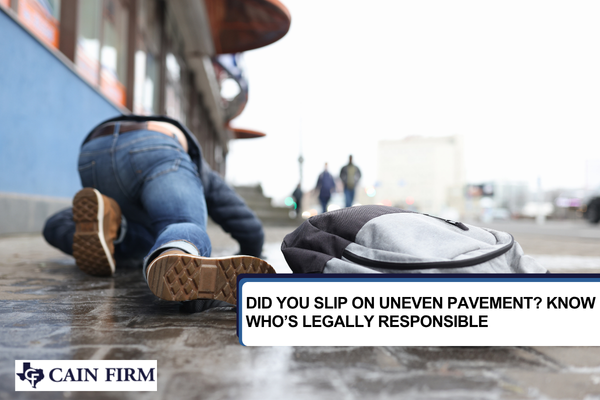What Are Pain And Suffering Damages In Texas Personal Injury Lawsuits?
Fort Worth personal injury lawyers explain pain and suffering damages
If you have been injured due to someone else’s negligence, you may be entitled to compensation for pain and suffering. These damages account for the physical, emotional, and psychological distress caused by an accident. Unlike medical bills or lost wages, pain and suffering damages are non-economic, meaning they compensate for intangible losses that impact your quality of life.
At the Cain Firm, our Fort Worth personal injury lawyers fight for maximum compensation for accident victims, ensuring they recover what they deserve. Contact us today for a free consultation to discuss your case.
Frequently asked questions about pain and suffering damages in Texas
We stand ready to protect your rights, prove fault, and collect maximum tax-free payment for your injury claims.

MEET OUR ATTORNEY
Brett Cain
What are pain and suffering damages in Texas personal injury lawsuits?
Pain and suffering damages compensate victims for the physical, emotional, and psychological effects of an injury caused by someone else’s negligence. In Texas, these damages fall under non-economic damages, which also include disfigurement, mental anguish, and loss of enjoyment of life.
To recover these damages, a victim must prove that the injury resulted from the defendant’s negligence and that it caused significant suffering. The legal definition of pain and suffering is not strictly defined, but factors considered in determining compensation include:
- The severity of the injury
- The impact on daily life, such as the inability to work or engage in hobbies
- Emotional distress, including anxiety, depression, and PTSD
- The duration of suffering
Unlike economic damages, there is no fixed formula for calculating pain and suffering compensation. Instead, a jury determines a reasonable amount based on the evidence presented. While some personal injury claims, such as medical malpractice cases, may have caps on non-economic damages, most injury claims do not.
What types of pain and suffering are available in a Texas personal injury lawsuit?
Texas personal injury victims can seek compensation for several types of pain and suffering damages, including:
- Physical pain: Physical pain includes immediate and chronic pain resulting from the injury. This can affect daily activities and require long-term treatment or therapy.
- Emotional distress: Emotional distress covers psychological effects such as anxiety, depression, PTSD, and other mental health issues stemming from the accident.
- Loss of enjoyment: Loss of enjoyment refers to the inability to participate in hobbies, recreational activities, or social interactions that were once an important part of life.
- Loss of consortium: Loss of consortium applies to the negative impact an injury has on relationships with a spouse or family members, including loss of companionship and intimacy.
- Scarring and disfigurement: Visible scarring or permanent disfigurement can affect a victim’s self-esteem and may require additional medical procedures to address.
- Inconvenience and disruption of daily life: Injuries often cause significant lifestyle disruptions, such as missing work, limiting physical activity, or needing assistance with everyday tasks. These disruptions can be compensable in a personal injury lawsuit.
Because pain and suffering compensation is subjective, having an experienced personal injury lawyer is crucial in ensuring fair compensation for all damages.
Who can be held liable for pain and suffering in Texas personal injury lawsuits?
Several parties may be held responsible for pain and suffering damages in Texas personal injury cases, including:
- The defendant: The at-fault party responsible for causing the accident through negligence or reckless actions is typically the primary defendant in a personal injury case.
- The employer: If an employee causes an injury while performing job-related duties, their employer may be held vicariously liable for damages under Texas law.
- The property owner: Property owners may be held accountable for injuries caused by hazardous conditions on their premises, such as slip-and-fall accidents.
- The manufacturer: If an injury is caused by a defective product, the manufacturer may be liable under product liability laws for the harm caused to consumers.
Identifying all responsible parties in a personal injury lawsuit is essential to maximizing compensation. A skilled attorney can investigate the case, determine liability, and fight for the full damages a victim deserves.
Get the justice and compensation you deserve
Pain and suffering damages play a critical role in personal injury claims, helping victims recover from the physical and emotional toll of an accident. However, proving and securing fair compensation for these damages can be challenging without experienced legal representation.
At the Cain Firm, we understand the complexities of Texas personal injury law and are dedicated to helping our clients seek the justice they deserve. If you or a loved one has been injured due to someone else’s negligence, contact our Fort Worth personal injury lawyers today for a free consultation. Let us fight for the compensation you deserve while you focus on healing.
Personal Injury Blog Posts:

Did You Slip on Uneven Pavement? Know Who’s Legally Responsible
Slipping on uneven pavement can cause serious injuries and raise questions about liability. This blog explains who may be legally

What to Expect When Filing a Personal Injury Lawsuit in Texas: Step-by-Step Guide
Wondering what to expect when filing a personal injury lawsuit in Texas? This step-by-step guide from the Cain Firm covers

How to Obtain an Insurance Settlement in Texas
There are over 6 million car accidents in the United States each year. Over a quarter million of those accidents